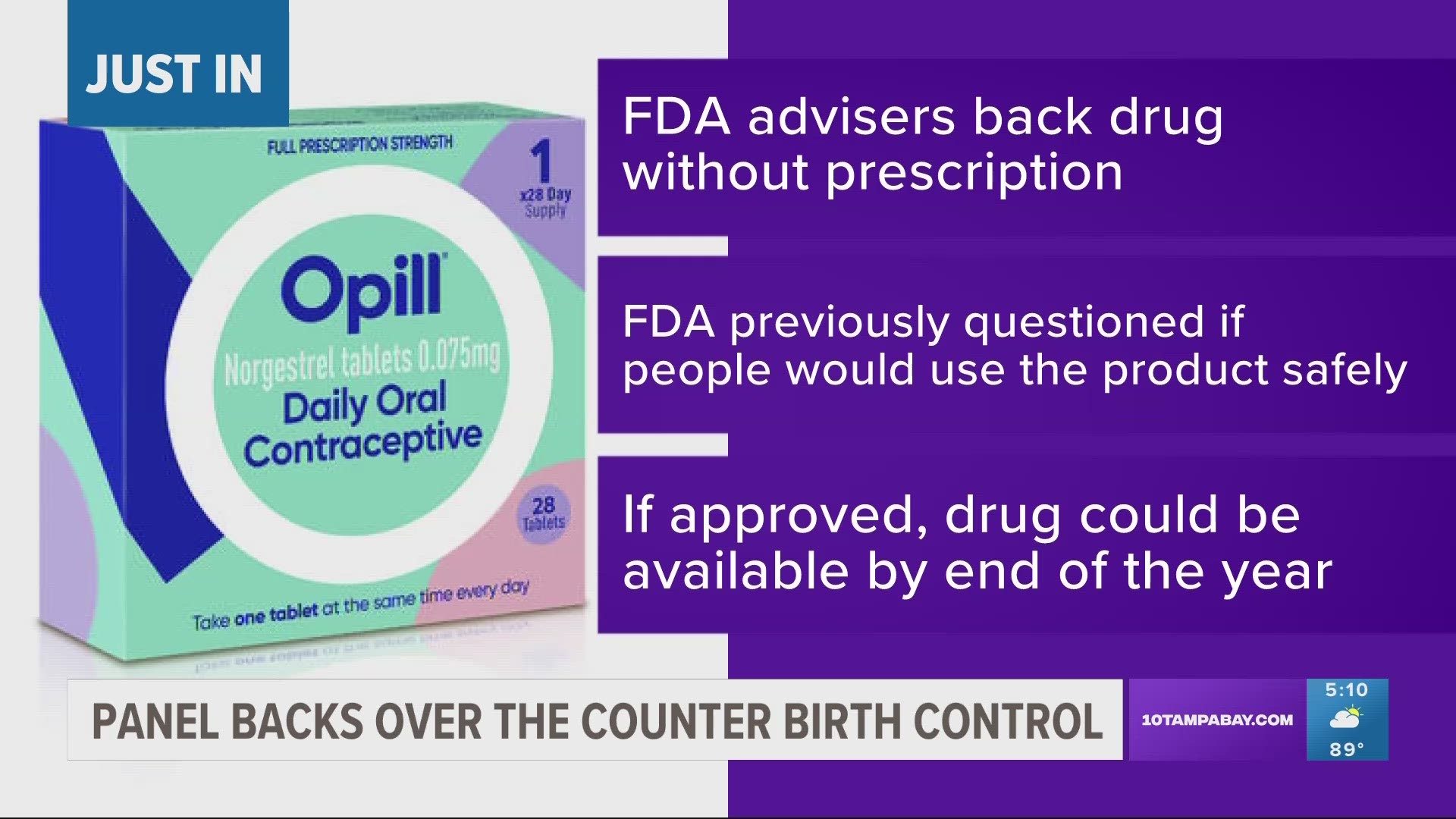The Future Of Family Planning: Over-the-Counter Birth Control And Its Implications

Table of Contents
Increased Accessibility and Convenience of Over-the-Counter Birth Control
Over-the-counter birth control promises a revolution in reproductive healthcare, primarily by dramatically increasing accessibility and convenience. This readily available option holds the potential to reshape how individuals manage their reproductive health.
Breaking Down Barriers to Contraception
For many, accessing prescription birth control presents significant hurdles. Over-the-counter availability dismantles these barriers in several key ways:
- Reduced healthcare costs associated with prescription birth control: The expense of doctor's visits, prescriptions, and insurance co-pays can be prohibitive. Over-the-counter options eliminate these costs, making birth control accessible to a wider population. This is particularly beneficial for low-income individuals and those lacking health insurance.
- Improved convenience and time-saving for individuals: Scheduling appointments, waiting for prescriptions, and navigating insurance claims can be time-consuming and inconvenient. Over-the-counter birth control allows individuals to access contraception quickly and easily, fitting it into their busy schedules.
- Increased access for individuals in underserved communities and rural areas: Limited access to healthcare providers, especially in rural or underserved communities, is a major barrier to contraception access. Over-the-counter birth control eliminates the need to travel long distances for appointments and prescriptions, making it a game-changer for these populations.
Expanding Options for Birth Control Methods
The move towards over-the-counter birth control isn't limited to a single method. We're seeing an expansion of options, including:
- Emergency contraception (morning-after pill): Already widely available over-the-counter in many regions, this provides crucial protection in cases of unprotected sex or contraceptive failure. Its accessibility is critical for preventing unintended pregnancies.
- Certain types of hormonal birth control: Some hormonal methods, such as specific progestin-only pills, may become available over-the-counter in the future, offering individuals more choices based on their needs and preferences. The effectiveness rates of these vary and should be carefully considered.
- Potential future over-the-counter options: Ongoing research and development could lead to even more birth control options becoming available without a prescription, potentially including long-acting reversible contraceptives (LARCs) like intrauterine devices (IUDs) in the future, although this presents greater logistical and safety challenges.
Potential Impacts on Public Health and Reproductive Rights
The implications of readily available over-the-counter birth control for public health and reproductive rights are far-reaching and complex.
Increased Rates of Contraceptive Use and Reduced Unintended Pregnancies
Wider access to birth control is strongly correlated with increased contraceptive use and a subsequent decrease in unintended pregnancies and abortions.
- Statistical evidence on the correlation between access to contraception and lower rates of unintended pregnancy: Numerous studies have shown a direct link between increased access to contraception and a reduction in unintended pregnancies and births.
- Discussion on the economic implications of reduced unintended pregnancies: Reducing unintended pregnancies saves significant healthcare costs associated with prenatal care, childbirth, and postnatal care. It also reduces the social and economic burden on individuals and families.
- Addressing potential concerns about increased rates of certain sexually transmitted infections: While increased access to contraception may not directly prevent STIs, comprehensive sex education emphasizing safe sex practices remains crucial. This education should accompany wider access to over-the-counter birth control.
Addressing Concerns about Misinformation and Self-Medication
The increased availability of over-the-counter birth control necessitates a parallel increase in accurate information and responsible use.
- The importance of comprehensive sex education and readily available resources: Education on various contraceptive methods, their effectiveness, and potential side effects is crucial to ensure informed decision-making.
- The role of pharmacists and healthcare professionals in providing guidance: Pharmacists can play a vital role in counseling individuals on appropriate contraceptive choices and addressing any concerns. They should be equipped to provide accurate information and screen for potential contraindications.
- Potential for government campaigns to promote responsible use: Public health campaigns can raise awareness about responsible use, potential side effects, and the importance of seeking professional advice when necessary.
The Role of Healthcare Professionals and Pharmacists
The shift towards over-the-counter birth control necessitates a reimagining of the roles played by healthcare professionals.
Shifting Roles in Family Planning
- Pharmacists providing crucial counseling and education on the use of over-the-counter birth control: Pharmacists will become even more central to family planning, offering advice and guidance on selecting and using appropriate methods.
- Doctors focusing on more complex family planning needs and addressing individual health concerns: Physicians can concentrate on more intricate cases, such as managing complex medical conditions impacting contraceptive choices or providing advanced family planning services.
- The importance of collaboration between healthcare professionals: Effective communication and collaboration between pharmacists and physicians are crucial to ensure patients receive comprehensive care.
Ensuring Proper Patient Education and Counseling
Providing accurate information and addressing potential side effects is paramount to the safe and effective use of over-the-counter birth control.
- The need for clear and accessible labeling on over-the-counter birth control products: Clear and concise labeling, including information on effectiveness, potential side effects, and contraindications, is vital for informed decision-making.
- The potential for telehealth services to aid in patient education: Telehealth can play a significant role in providing accessible and convenient education and counseling to individuals, especially in remote areas.
- Strategies for providing culturally sensitive and inclusive education: Educational materials and counseling should be culturally appropriate and sensitive to the diverse needs and backgrounds of the population.
Conclusion
The increasing availability of over-the-counter birth control marks a significant shift in family planning. While offering increased accessibility and convenience, it also necessitates a renewed focus on education and responsible use. Healthcare professionals, pharmacists, and public health initiatives play a vital role in ensuring safe and effective use of these methods. By addressing potential challenges proactively, we can harness the potential of over-the-counter birth control to improve reproductive health outcomes and empower individuals to make informed choices about their reproductive lives. To learn more about the options available and how to access over-the-counter birth control in your area, consult your local pharmacist or healthcare provider. Understanding the implications of over-the-counter birth control is crucial for shaping the future of family planning.

Featured Posts
-
 Elias Rodriguez Suspect In Israeli Embassy Attack Shouting Free Palestine
May 23, 2025
Elias Rodriguez Suspect In Israeli Embassy Attack Shouting Free Palestine
May 23, 2025 -
 Siren Film Review Analyzing The Performances Of Moore Fahy And Alcock
May 23, 2025
Siren Film Review Analyzing The Performances Of Moore Fahy And Alcock
May 23, 2025 -
 La Libertad Venganza Politica Tras La Denuncia Contra El Excongresista Elias Rodriguez Por App
May 23, 2025
La Libertad Venganza Politica Tras La Denuncia Contra El Excongresista Elias Rodriguez Por App
May 23, 2025 -
 Roger Daltreys Sight And Hearing The Who Singer Faces Health Challenges
May 23, 2025
Roger Daltreys Sight And Hearing The Who Singer Faces Health Challenges
May 23, 2025 -
 Ranking Pete Townshends Solo Albums From Worst To Best
May 23, 2025
Ranking Pete Townshends Solo Albums From Worst To Best
May 23, 2025
Latest Posts
-
 Fort Worth Stockyards An Unforgettable Night With Joe Jonas
May 23, 2025
Fort Worth Stockyards An Unforgettable Night With Joe Jonas
May 23, 2025 -
 Dc Legends Of Tomorrow Frequently Asked Questions And Answers
May 23, 2025
Dc Legends Of Tomorrow Frequently Asked Questions And Answers
May 23, 2025 -
 The Last Rodeo Exploring Neal Mc Donoughs Character
May 23, 2025
The Last Rodeo Exploring Neal Mc Donoughs Character
May 23, 2025 -
 A Deep Dive Into Dc Legends Of Tomorrow
May 23, 2025
A Deep Dive Into Dc Legends Of Tomorrow
May 23, 2025 -
 Neal Mc Donough And The Last Rodeo A Western Showdown
May 23, 2025
Neal Mc Donough And The Last Rodeo A Western Showdown
May 23, 2025
